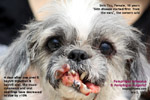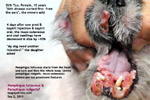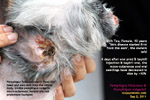Thursday, Sep 1, 2011
"My dog looks forward to coming to your Surgery," the daughter
said to me. "She used to be afraid of going to the vet." I was
surprised to see this 10-year-old Shih Tzu so much more
energetic and wagging his tail, as if she wanted to enjoy
every second of living.
4 days of medication and better food like meat and eggs and
she behaved like a naughty inquisitive puppy looking for
action. I had scheduled the operation to remove the oral
tumours at 10 am today but since the owners had problems
getting a taxi on the road side, the dog's body felt very hot
now. The "tumours" had become ulcerated and infected, causing
the dog much pain. The submandibular and lower lymph nodes had
enlarged considerably. Whether this was an infection or part
of tumour spread, this was hard to say for the time being.
I had to postpone the surgery to next Monday as it is not wise
to operate a dog that is hyper-excited. This is an old dog
with poor nutrition as Vet 1 had advised to feed only
vegetables and rice as the dog suffered from skin diseases,
including big ulcerations in both ears and below the pads of
all paws. The owner said that the original skin problem
started with the ears. Vet 1 had diagnosed an auto-immune skin
condition called pemphigus* and so advised vegetables and rice
only. Sometimes it is hard to get the correct information from
the owner as there seems to be no rationale for a non-protein
diet recommendation from the vet when the dog is diagnosed
with pemphigus, an auto-immune skin disease.
"We had been waiting for the taxi for one hour and under the
sun," the daughter said. "Next time, I will book a taxi."
This could be a case of pemphigus vulgaris and pemphigus
foliaceus. The owners complained that the dog had blisters or
ulcers in the ears first (I took some pictures - pemphigus
foliaceus starts as blisters in the ears and spreads to the
body but does not involve the mouth).
In this case, the mouth got ulcers esp. at the skin-mouth
junction. Pemphigus vulgaris involves the muco-cutaneous
junctions but not pemphigus foliaceus). Now the dog also has
"ulcers" in both ears, ulcers in the mouth-skin junctions and
all the pads of the 4 limbs. I have images to show later.
The prednisolone injection given did suppress the auto-immune
system. The submandibular lymph nodes are now not spreading
caudally like a long cord involving the other lymph nodes, as
at 4 days ago. The swelling is now localised at the
submandibular lymph nodes which are around 3 cm x 3 cm x 2 cm
- very large.
I took a blood test today and would review the case 3 days
later again. Biopsies for histopathology would need to be
specially prepared to get good lab results and these may be
costly. The young lady showed me her handphone video proving
that her dog was eating ravenously. "I have no doubt that your
dog has an excellent appetite," I said. "It is just that any
person or dog who has an excellent appetite will put on weight
but your dog is very skinny! It could be the quality of food
since your vet advised only veggies and rice."
The young lady was very pleased with the much better health of
the dog and the reduction in the mouth "tumours". Definitely
there was significant reductions in oral swellings and
inflammation and the dog was now more active than an
inquisitive Shih Tzu puppy. I took some pictures to bring
veterinary medicine alive to those undergraduates "entombed"
in their rooms studying skin diseases in dogs for their final
examinations. These are presented below:
 |
Day 1.
The old Shih Tzu has 3 mouth tumours? |
| |
|
|
 |
 |
|
|
 |
|
 |
 |
|
|
4 days after one pred
and baytril injection and oral baytril, the
muco-cutaneous swellings have reduced by at least 10%,
delighting the young lady owner. |
|
"Does my dog need
another injection?" she asked.
I gave a small dose of pred and baytril injection as sometimes
this would be make an owner appreciative. I would wait for the
blood test and review in 4 days' time.
In conclusion, this is
likely a case of pemphigus vulgaris and pemphigus foliaceus.
Long-term immunosuppressive treatment and regular monitoring
would be the treatment. Over-treatment will kill the dog and
so there must be a long-term care and blood test for this dog.
There is no permanent cure for this auto-immune disease.
In pemphigus foliaceus and vulgaris, diagnosis is based on
history, clinical signs, histopathology and immunopathology.
Therapy must be immunosuppressive to be effective and is
palliative rather than curative.
In practice, it costs a lot of money to diagnose this skin
disease. The owner had spent quite a large sum of $2,000
previously. In this case, rather than making the owner to
spend more money on biopsy, I consider that it is best to get
onto the immunosuppressive treatment and regular 3-monthly
monitoring of blood to ensure that the dog is not killed by
over-treatment of the immuno-suppressive drugs.
That would be in the best interest of the owner and the dog. I
will review in 4 days' time, i.e. on Monday. The dog is much
well loved as a family member especially the daughter.
Pemphigus is a rare skin disease in dogs and so is sometimes
misdiagnosed as allergies to dry dog food - hence, it was
probably why Vet 1's recommend home-cooked vegetables and rice
and no meat.
|